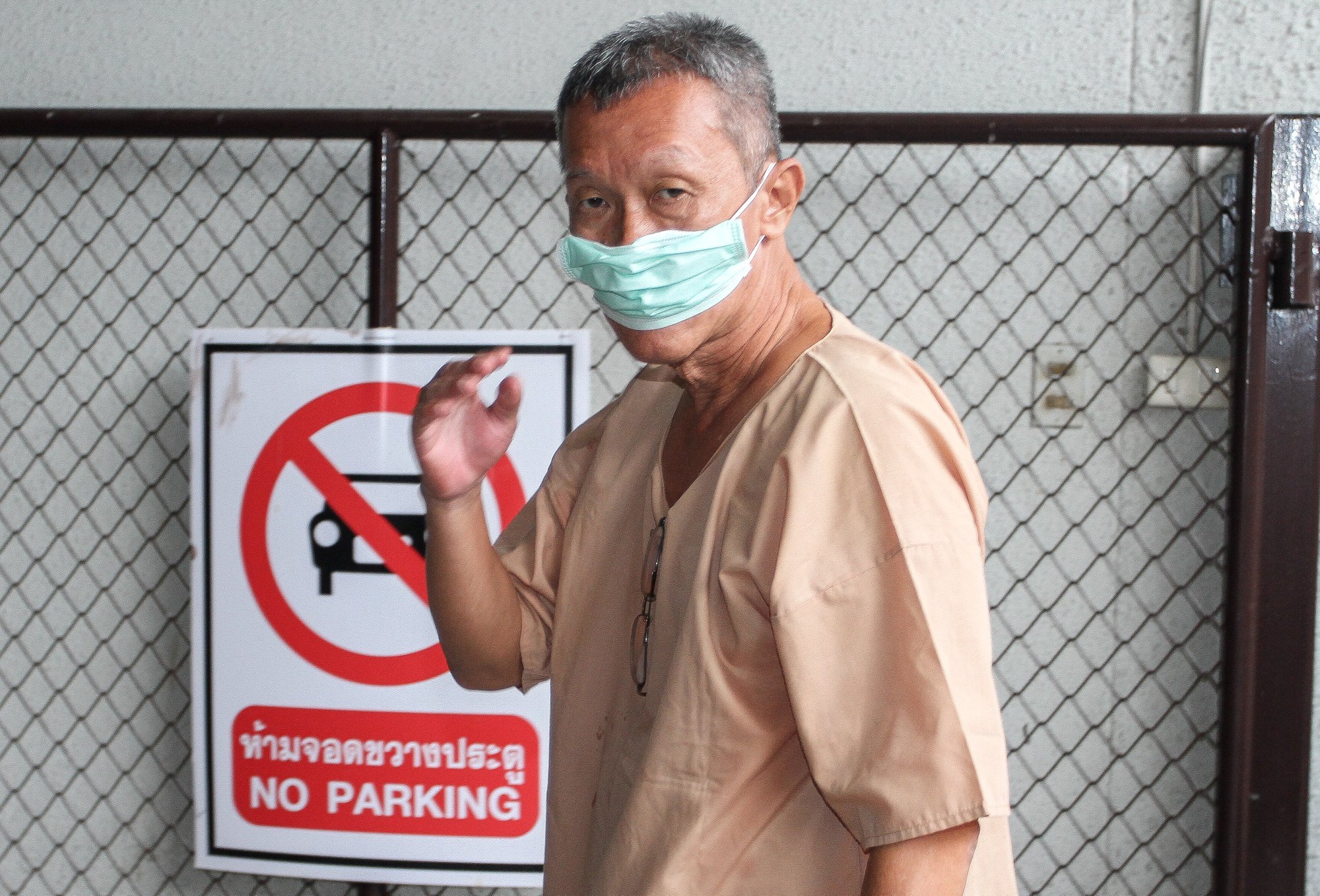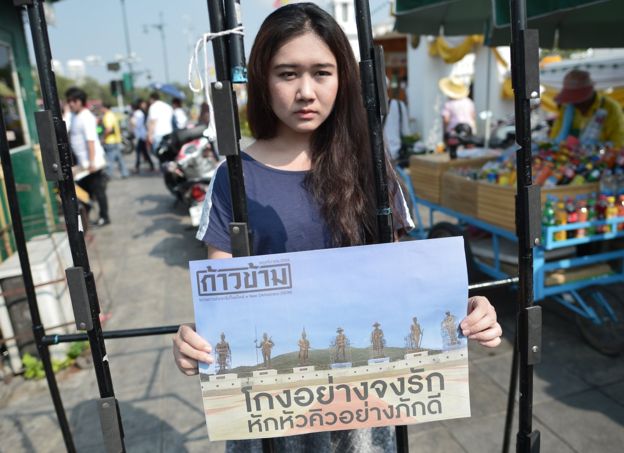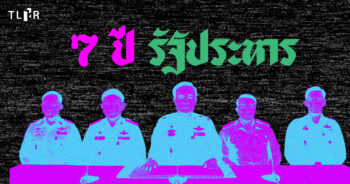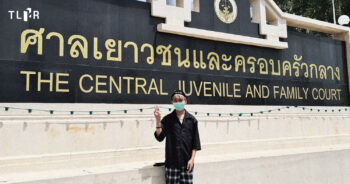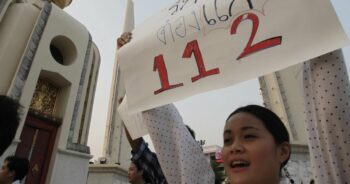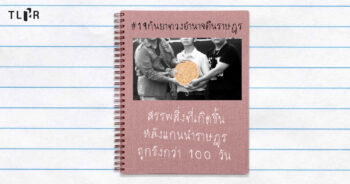Since late 2016, in the aftermath of the passing of King Rama IX and the accession of King Rama X, prosecutions of lèse majesté cases or the violation of the Penal Code’s Section 112 spiked sharply. The “witch hunt” or vigilante actions taken against people who hold different views led to prosecution of dozens of lèse majesté cases.
2017 saw the prosecution of several major cases invoking Section 112 including the case against “Pai Dao Din” who shared a BBC Thai news link, cases against the individuals who shared Somsak Jeamteerasakul’s Facebook pose about the removal of the Plaque Celebrating the 1932 Thai Revolution, or the revival of cases stemming from alleged offences committed prior to the coup, etc. (Please see A Review of Section 112 Cases in 2017)
The year 2018 saw a number of changes to the enforcement of Section 112. No new cases invoking Section 112 have been prosecuted in 2018 (as far as we know). Meanwhile, several ongoing lèse majesté cases have been dismissed, particularly cases under the review of civilian courts, though this does not necessarily indicate more freedom to exercise the right to free expression in Thailand. Even though the authorities are now reluctant to press lèse majesté charges, charges invoking other laws including the Computer Crime Act or “sedition” per Section 116 continue to be an important tool to restrict freedom of expression and purge dissenters.
These changes can be directly attributed to the royal succession. It has not stemmed from the authorities or personnel in the justice process realizing the many protracted problems caused by the enforcement of Section 112. It has also not stemmed from more respect for human rights in Thailand. Restriction of freedom of expression remains in place, though such restriction may change in its appearance.
This report is an attempt to shed light on the changes that happened in 2018.
Military prosecutor decided to drop a case against Sulak Sivaraksa after the latter’s audience with His Majesty the King
The change in lèse majesté prosecution could have started from 17 January 2018 when the prosecutor of the Military Court decided to not indict Sulak Sivaraksa on a lèse majesté charge. The case against him stemmed from his speaking in a 2014 panel discussion in which he was accused of making critical comments about an ancient historical event, King Naresuan’s Elephant Battle. According to the military prosecutor, there was not sufficient evidence to hold the accused accountable, even though prior to this, the police had decided to file the case.
After the non-prosecution order was announced, Sulak revealed that it came as a result of his speaking with His Majesty the King Vajiralongkorn. He alluded to how His Majesty had then advised the government to drop the case against him. On 1 December 2017, after a graduation ceremony in which Sulak was given a doctorate degree, he was granted an audience with His Majesty, during which time he personally let His Majesty know about the pending case against him.
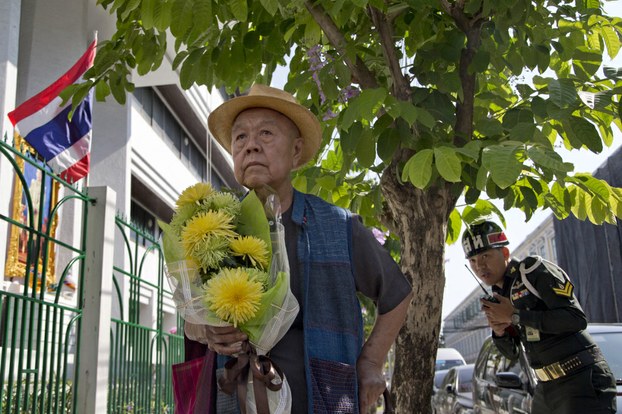 Photo by Associated Press News
Photo by Associated Press News
In his personal Facebook’s post on 6 December 2018, Sulak even expressed his deepest gratitude to His Majesty for bringing an end to the prosecution against him. Furthermore, he wrote “His Majesty has even instructed the Chief Justice and the Attorney General to bring to an end to prosecutions invoking Section 112 and to not allow it to be used as a political tool.”
That perhaps explains the pivot in enforcement of Section 112 at the present time.
New guidelines by the Attorney General
The Attorney General’s directive dated 21 February 2018, addressed to high-ranking officials of all levels in the Attorney General’s Office, instructs all units of the public prosecutor’s department to receive and review immediately investigation reports filed by inquiry officials regarding Section 112 cases. The public prosecutors are then instructed also to furnish the Office of the Attorney General a copy of the police investigation report in each case and not to make any decisions about these cases. They are informed that it is the Attorney General who will decide as to whether the cases will be filed in Court or not. Now the rank-and-file public prosecutors no longer have the power to order prosecution of 112 cases.
The guidelines apply to procedures while 112 cases are pending in either the Lower Court or the Appeals Court. A copy of any court verdict has to be first submitted to the Office of the Attorney General before any decision regarding further action can be made.
In addition, the Attorney General has issued the Regulation of the Office of the Attorney General concerning criminal prosecutions which do not serve the public interest or which may affect national safety, security or other important interests of the country, (Regulation No. 2, 2018 dated 15 June 2018).
The regulation is a revision of an existing regulation issued in 2011. More reasons have been added and can be cited to refrain from prosecuting certain cases that do not serve public interest. The additional reasons to be pondered before deciding on prosecution are purported to include “the reasons proposed by the Prime Minister or other agencies with regard to impact on the stability and safety of the King, the Queen, the Heir-apparent, or the Regent.” Another tweak thanks to the new regulation is that whereas before the public prosecutors had the power to decide against prosecuting cases that did not serve public interest, now according to the new regulation the Attorney General exclusively retains the power to prosecute a case or not or to withdraw a case for any reason.
As a result of the two revisions, now it is the Attorney General who holds the exclusive power to decide if a case shall be prosecuted or not, excluding the rank-and-file public prosecutors from making such decisions. And the Attorney General can even initiate a withdrawal of a case based on proposals made by the Prime Minister or other agencies. This would ensure the streamlining of prosecutions of such cases based on these two regulations.
Case dismissed despite guilty plea, still defendant remains incarcerated
According to the Thai Lawyers for Human Rights (TLHR), there has been no new lèse majesté cases filed with the Court this year. Even though some arrests were carried out in 2018 in cases related to Section 112, the alleged offences had been committed several years ago and the arrest warrants were still active. The accused are yet to be brought to answer to the charges.
The courts dismissed several lèse majesté cases in 2018 even though the defendants had already given their guilty pleas. This was unprecedented.
The cases against Thanat aka “Tom Dundee”
Tom Dundee, a member of the UDD and a popular singer, had previously been convicted in two cases concerning the violation of Section 112. In early 2018, he was indicted in two more such cases. But the courts dismissed the two cases, even though he pleaded guilty in both cases including:
A case stemming from his public speech in Lamphun in 2011. The Criminal Court dismissed the case on 29 March 2018 stating that based on the plaint it is not clear to the Court that the defendant had committed an act of royal defamation. Even though the defendant had pleaded guilty, the Court found it was not possible to convict him.
A case stemming from his public speech in Ratchaburi in 2010. The Ratchaburi Provincial Court dismissed the case on 29 June 2018 stating that based on the plaint and adduction of the plaintiff, it is not clear to the Court that the defendant had committed an act of defamation, insult and threatening as alleged. Even though the defendant had pleaded guilty, the Court found it was not possible to convict him.
Despite being acquitted in both cases, Thanat remains incarcerated due to his obligation to serve time for two previous convictions in which the Criminal Court and the Military Court, respectively, sentenced him to 10 years and 10 months of imprisonment, altogether. Unfortunately, the dismissals of the 112 cases against him in 2018 have yet to restore his freedom to him.
The case against Sakan
The case against Sakan (Last name withheld) resulted from a talk he gave while serving time in the Bangkok Remand Prison. His talk related to political events and was reported by his fellow inmate in 2009. He was indicted in December 2017. Initially, he pleaded not guilty. He later backtracked and decided to plead guilty, just before the commencement of witness examination.
On 14 November 2018, the Criminal Court, however, decided to dismiss the case against him claiming the statement allegedly made while he was doing his time in prison can be subject to interpretation and it failed to refer exactly to particular persons. Even though the defendant decided to plead guilty, it was not possible to ascertain that the alleged statement was defamatory to the King and the Queen, the Court held.
Dismissed 112 charge, but convicted on another charge
Apart from such dismissals, there was a tendency in 2018 for the courts to dismiss cases allegedly violating Section 112, but convict defendants on other charges, particularly offenses per the Computer Crime Act and “sedition” per the Penal Code’s Section 116. Therefore, even though several defendants have been dismissed from 112 cases, they still find themselves convicted of other charges and sentenced to jail terms. For example:
The case against human rights lawyer Prawet: Convicted of Section 116, but no decision made on 112 charge
Human rights lawyer Prawet Prapanukul was indicted after allegedly posting ten Facebook messages deemed a violation of Section 112, and three other messages deemed a violation of Section 116. He decided to fight the charges and since the beginning refused to accept the trial procedure. He told the Court he would not give evidence and would not agree to witness examination.
On 27 June 2018, the Criminal Court, however, ruled against him on violation of Section 116. He was sentenced to five months per count, altogether 15 months, and another month has been added as a result of his refusing to be fingerprinted during the police questioning. The Court, however, mentioned nothing about the lèse majesté charges against him, and the ten incriminating messages.
On the judgment day, Prawet had been incarcerated for 13 months already. As a result, he was discharged in August, after serving his time for 16 months as sentenced by the Court.
The case against a blind woman in Yala: Acquitted of lèse majesté, convicted under the Computer Crime Act
Ms. Nurahayadi Masao, 24, a visually impaired woman in the province of Yala, was charged for violating Section 112. It was alleged that she had used an app for visually impaired persons to post her comment and share an article by Giles Ungphakorn on her personal Facebook page in the wake of the passing of King Rama IX. She was indicted in November 2017 and later pleaded guilty to the charge. On 4 January 2018, the Yala Provincial Court convicted her and sentenced her to one year and six months of imprisonment without suspension.
In the wake of rampant online reports about her story, her family was asked by the Court to pick her up from the prison on 23 January 2018. They were told she was discharged and no one knew who paid the money for her discharge and how much it was.
On 12 February 2018, the Appeals Court Region 9 decided to dismiss the lèse majesté case against her, claiming that since the defendant suffers from visual impairment in both eyes, it is impossible that she could copy and paste the article whilst knowing that the content of the article is deemed offensive to King Rama IX.
Soon after, her family revealed that on 4 March 2018 some officers took Ms. Nurahayadi from her home. On 5 March, the public prosecutor from the Office of the Attorney General decided to prosecute her under the Computer Crime Act. In this case, she is alleged to have shared an audio clip of a radio program run by “DJ Tito” and by Surachai Danwattananusorn on her Facebook page back on 10 October 2016. On 6 March 2018, she pleaded guilty to the charge and the Criminal Court convicted and sentenced her to one year of imprisonment without suspension. As a result, she has been serving her time in the Central Women’s Correctional Institution in Bangkok until now.
The case of “Kay” and his online sale of collectible coins: Convicted under the Computer Crime Act
‘Kay’ (pseudonym) posted an ad to sell his collectible coins in a Facebook group in the wake of the passing of King Rama IX. He was then having a heated exchange with one Facebook user and that person screen-captured the conversation and reported the case against Kay. He even came with his friends to physically assault Kay. As a result, Kay was charged for violating both Section 112 and the Computer Crime Act’s Section 14.
Despite being granted bail, Kay was indicted in the Chonburi Provincial Court and he decided to fight the charge. On 5 July 2018, the Court decided to dismiss the 112 charge against him but convict him for spreading false information online in violation of the Computer Crime Act’s Section 14(1). He was sentenced to one year of imprisonment but given that the evidence he gave was useful for the adjudication, his imprisonment was reduced to eight months. The case is now pending in the Appeals Court.
The royal arch arson case: Acquitted on lèse majesté, convicted of other crimes
There are 11 defendants in this case. They are accused of setting fire to Decorative Arches to honor the King in various places in Khon Kaen in early May 2017. The suspects can be divided into two groups. The first group is composed of nine teenagers who were detained and prosecuted in three cases based on three crime scenes. The charges against them include being members of a secret society, arson, mischief and an offence under Section 112. All the defendants pleaded guilty to the charges and the Phon Provincial Court convicted and sentenced them to varying punishments.
Later, 6 of 11 defendants decided to appeal two cases and the Appeals Court Region 4 ruled on 18 September 2018 to acquit them of the lèse majesté charges. The Court found the six defendants intended to commit an act of mischief by damaging the Decorative Arches but had no intention to violate Section 112 and convicted them of other crimes instead. The defendants were sentenced to different prison terms from 3– 4 years and six months in both cases.
Another group of suspects is composed of two defendants including Mr. Preecha and Mr. Sarote who were arrested after the arrests of the teenagers. They also face the same charges and were indicted in three separate cases. Both pleaded guilty to all charges and in June 2018, the Phon Provincial Court decided to acquit them for the offence against Section 112, in all three cases. They were instead convicted of other crimes and were each sentenced to 12 years and six months.
Thai Lawyers for Human Rights still worked in 2018 to offer legal assistance to a defendant who has been accused of committing lèse majesté as a result of posting ten Facebook messages. He decided to plead not guilty. On 6 February 2018, the Court convicted the defendant of violating Section 112 for posting one of the alleged comments and sentenced him to jail without suspension. The case is now pending in the Appeals Court.
It has also been reported that Mr. Anuwat Thinrat, a core member of the Red Shirts in Nakhon Ratchasima Province accused of violating Section 112 as a result of his speech during a rally in Nakhon Ratchasima on 23 February 2014 was convicted on 8 March 2018. The Nakhon Ratchasima Provincial Court read the verdict of the Supreme Court to affirm the verdict of the Appeals Court to have him convicted and sentenced to three years of imprisonment without suspension.
Not all 112 cases have been dismissed by the Court, after all in the 2018.
Another new trend? Convicted of defamation by the Supreme Court, even though the injured persons themselves did not report the case
On 27 December 2018 the Supreme Court made a ruling in a landmark case against Mr. Anant (Last name withheld), 70, who was accused of violating Section 112 and defamation per the Penal Code’s Section 326. It was alleged that during a conversation with a security guard in 2012, he verbally insulted Princess Sirindhorn and Princess Soamsawali. The case was revived and prosecuted in the aftermath of the 2014 coup.
Later, the Supreme Court convicted “Anant” for two counts of violating Section 326 and sentenced him to two years of imprisonment with suspension and a fine of 40,000 baht. The Court found the two royals are not covered by Section 112 since there is only one Heir-apparent, the Crown Prince Mahawachiralongkon. The Court, however, found the defendant had verbally insulted both of them, which constituted a defamatory offence (for full verdict of the court, please see Prachatai News).
According to the normal course of law, if an injured party does not complain it is impossible for an inquiry official to initiate an investigation for defamation. And even had an investigation taken place, a public prosecutor would not be allowed to prosecute the case, as such investigation would be considered invalid.
The verdict has now made it possible for conviction in a personal offence case (Section 326) even though the injured party themselves have not reported the case. If the investigation has been carried out, the public prosecutor can proceed to prosecute the case.
The Court even invoked the 2017 Constitution to justify the investigation in this case even though the offence in this case had been committed prior to the promulgation of the Constitution. In other words, the Court invoked law retrospectively to convict the defendant.
This verdict and others like it have to be further monitored to see as to how it will affect the use of Section 112 and insult law against individuals.
Some defendants have been bailed out, while others remain behind bars
Another trend in 2018, one that continues from the previous year, is the courts have granted bail to lèse majesté suspects in certain cases. Previously, it was almost impossible to bail out suspects in lèse majesté cases.
In 2018 the Military Court granted bail to “Waen” Nutthida Meewangpla, a key witness in the killing of six civilians in Wat Pathum after she had been remanded in custody for more than three years and five months. , a suspect accused of spreading Banpot audio clip in 29 counts, was also bailed out after having lived behind bars for nearly four years while the case has been going on. “Bupha”, a patient with mental illness, who is accused of committing lèse majesté after posting 13 Facebook messages, has also been bailed out after having been remanded in custody for nearly two years. These are among other cases of bail being granted.
Meanwhile, we have learned that at least eight suspects in lèse majesté cases have not been granted bail while the cases against them are going on. Sirapob or ‘Rungsila’, a political poet, has applied for bail seven times to no avail. The Military Court keeps denying him bail even though he has been incarcerated for more than four years and five months and only three witnesses have been examined in his case so far.
Several 112 cases have been tried in the Military Court since the 2014 coup in which the defendants have pleaded not guilty. The trials have been proceeding so slowly and the defendants have been denied bail. Even if they had been bailed out, they would have to spend more than four years to fight the charges. Most of the lèse majesté cases tried in Military Court have not reached any conclusion.
There are several suspects who remain behind bars as their bail has been denied. As of the end of 2018, there are at least 18 suspects accused of violating Section 112 whose cases have reached final verdicts, but they are still detained in prison (including lèse majesté suspects who are remanded as a result of their exercising freedom of expression, excluding other suspects in fraudulent cases or seeking personal interest cases).
Additionally, political exiles in various countries cannot return home as a result of their airing opinions regarding the monarchy that have led them to be prosecuted for violating Section 112. In January 2018 Chanoknan Ruamsap aka “Cartoon”, a former spokesperson of the New Democracy Movement (NDM) was summoned to answer to the charge as a result of her sharing a BBC Thai news link regarding the profile of King Rama X since December 2016, similar to “Pai Dao Din”. But she decided to seek asylum in another country and has become the latest political refugee from this charge.
Ongoing restrictions and intimidation
Throughout 2018 TLHR continued to receive reports about cases of police and military forces raiding residences of individuals, and the summoning of individuals to report themselves to officials in either military barracks or police stations after the individuals posted comments about the monarchy or happened to be administrators of certain political web pages. Apart from questioning and asking for personal information, the officers even prepare written testimonies and copy/check data from the individuals’ electronic devices and ask the individuals to sign documents declaring they will refrain from doing such things again. Such cases have happened quietly and have not been covered by the media. It is unclear as to the exact number of such cases in 2018.
Meanwhile, online censorship of contents related to the monarchy continues unabated. According to Facebook, from January to June 2018 it blocked access to 285 pages and posts concerning Thailand, most of which are related to the monarchy. Blockage was made to 283 sets of contents per the request of the Ministry for the Digital Economy and Society.
2018 also saw robust vigilantism by ordinary royalists. Judicial and socially sanctioned measures have been used to purge anyone appearing to make a comment about the monarchy. For example, Maj Gen Dr Rianthong Nanna, director of Mongkutwattana Hospital, declared he would fire hospital staff allegedly involved with tearing banknotes bearing the portrait of the King and those refusing to hand over their mobile phones for the institution to check how they express themselves online, though no cases related to Section 112 had been reported from among hospital staff.
Of late, the Club of Online Victims has reported a case with the Technology Crime Suppression Division (TCSD) accusing “Mixy Bigmouth,” a net idol, of committing libel by posting a message criticizing the dress worn by Miss Universe pageant contestants that are designed by Princess Sirivannavari.
Amidst changes in the status, role and content of the laws concerning the monarchy in 2018, any expression of thought in public, including any criticisms based on factual information, could be construed as a sensitive comment and could be deemed “crossing the line” in Thailand.
Change seems to have taken place in ‘form’, though the ‘substance’ of the law remains the same.



